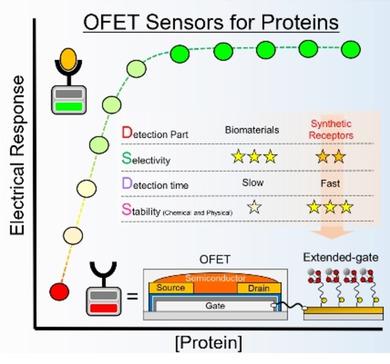当前位置:
X-MOL 学术
›
Chemistryopen
›
论文详情
Our official English website, www.x-mol.net, welcomes your feedback! (Note: you will need to create a separate account there.)
Protein Assays on Organic Electronics: Rational Device and Material Designs for Organic Transistor-Based Sensors.
ChemistryOpen ( IF 2.3 ) Pub Date : 2020-05-12 , DOI: 10.1002/open.202000025 Tsukuru Minamiki 1 , Riku Kubota 1 , Yui Sasaki 1 , Koichiro Asano 1 , Tsuyoshi Minami 1
ChemistryOpen ( IF 2.3 ) Pub Date : 2020-05-12 , DOI: 10.1002/open.202000025 Tsukuru Minamiki 1 , Riku Kubota 1 , Yui Sasaki 1 , Koichiro Asano 1 , Tsuyoshi Minami 1
Affiliation

|
Artificial receptor‐based protein assays have various attractive features such as a long‐term stability, a low‐cost production process, and the ease of tuning the target specificity. However, such protein sensors are still immature compared with conventional immunoassays. To enhance the application potential of synthetic sensing materials, organic field‐effect transistors (OFETs) are some of the suitable platforms for protein assays because of their solution processability, durability, and compact integration. Importantly, OFETs enable the electrical readout of the protein recognition phenomena of artificial receptors on sensing electrodes. Thus, we believe that OFETs functionalized with artificial protein receptors will be a powerful tool for the on‐site analyses of target proteins. In this Minireview, we summarize the recent progress of the OFET‐based protein assays including the rational design strategies for devices and sensing materials.
中文翻译:

有机电子产品的蛋白质检测:基于有机晶体管的传感器的合理设备和材料设计。
基于人工受体的蛋白质检测具有各种吸引人的特点,例如长期稳定性、低成本生产过程以及易于调整目标特异性。然而,与传统的免疫测定相比,这种蛋白质传感器仍然不成熟。为了提高合成传感材料的应用潜力,有机场效应晶体管 (OFET) 因其溶液可加工性、耐用性和紧凑集成而成为蛋白质分析的一些合适平台。重要的是,OFET 能够对传感电极上人工受体的蛋白质识别现象进行电读出。因此,我们相信用人工蛋白质受体功能化的 OFET 将成为现场分析目标蛋白质的有力工具。在这个迷你评论中,
更新日期:2020-05-12
中文翻译:

有机电子产品的蛋白质检测:基于有机晶体管的传感器的合理设备和材料设计。
基于人工受体的蛋白质检测具有各种吸引人的特点,例如长期稳定性、低成本生产过程以及易于调整目标特异性。然而,与传统的免疫测定相比,这种蛋白质传感器仍然不成熟。为了提高合成传感材料的应用潜力,有机场效应晶体管 (OFET) 因其溶液可加工性、耐用性和紧凑集成而成为蛋白质分析的一些合适平台。重要的是,OFET 能够对传感电极上人工受体的蛋白质识别现象进行电读出。因此,我们相信用人工蛋白质受体功能化的 OFET 将成为现场分析目标蛋白质的有力工具。在这个迷你评论中,



























 京公网安备 11010802027423号
京公网安备 11010802027423号